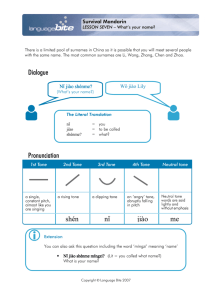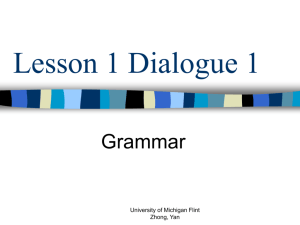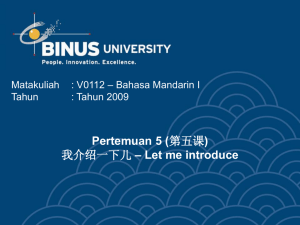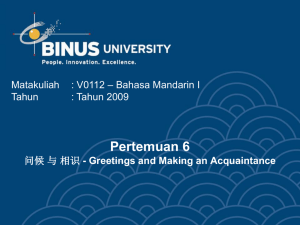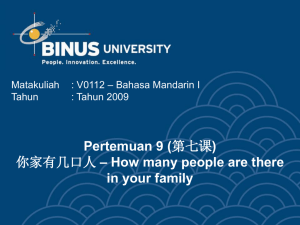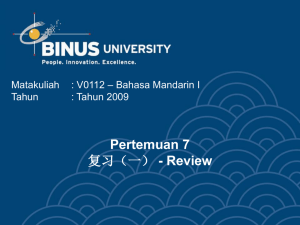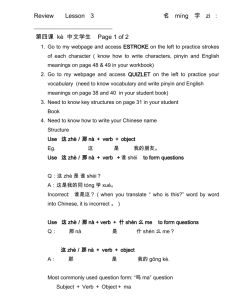Pertemuan 4 ( – May I know your name 您贵姓
advertisement
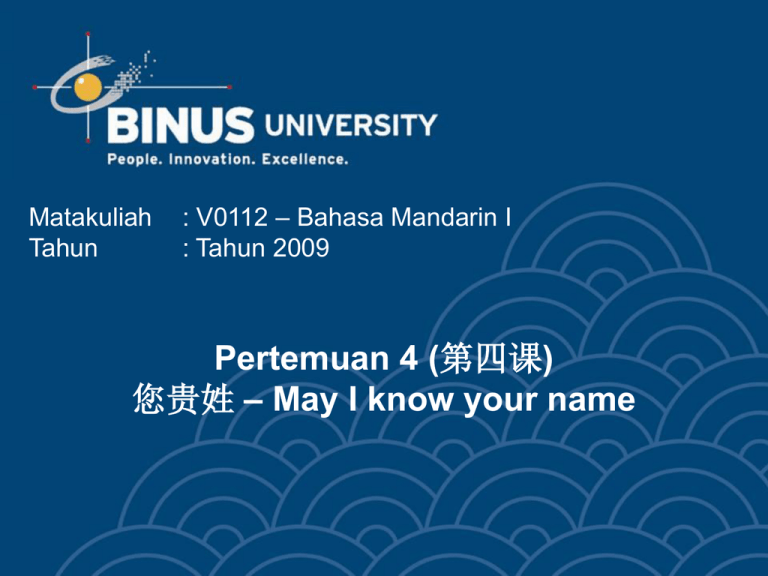
Matakuliah Tahun : V0112 – Bahasa Mandarin I : Tahun 2009 Pertemuan 4 (第四课) 您贵姓 – May I know your name • 我叫玛丽 I am Mary. Wŏ jiào Mălì • 认识你很 高兴。 I am pleased to meet you. Rènshi nĭ hěn gāoxìng. • 您贵姓? May I know your name Nín guìxìng? • 你 叫什么 名字? What’s your name? Nín jiào shénme míngzi? • 他姓什么? What’s his name? Tā xìng shénme? • 她不是老师,她是学生。 She is not teacher, she is a Tā bú shì lăoshī, tā shì xuéshēng. student. 生词 New Words 1. 2. 3. 4. 5. 6. 7. 8. 9. 叫 认识 高兴 贵姓 name 姓 什么 名字 是 学生 jiào rènshi gāoxìng guìxìng to call, to be known as to know glad (polite) your xìng shénme míngzi shì xuésheng one’s family name is… what name to be student 10. 11. 12. 13. 14. 15. 16. 那 个 这 人 大夫 留学生 朋友 nà that gè (measure word) zhè this rén person dàifu doctor liúxuéshēng foreign student péngyou friend 专名 Proper Names 美国 měiguó the United States 注释 Notes 1) 2) 3) “您贵姓?” May I know your name? This is respectful and polite way asking the name person. The answer is not “我贵姓…”,but “我姓…” “你叫什么名字?” What’s your name? One may also use “你叫什么?”. It is used by elders when they want to know the names of young people or between young people. One shouldn’t use it, therefore, when he wants to know an elder’s name or when he needs to show respect and politeness to his hearer. “他姓什么?” What’s his name? It is used for asking another person’s name. one shouldn’t say “他贵姓?”. 语法 Grammar 1. 用“吗”的问句 Question with “吗” An interrogative sentence is formed by adding the modal particle “吗” at the end of a declarative sentences, e.g. 1. 你好吗? 3. 他是老师吗? 2. 你身体好吗? 2. 用疑问代词的问句 Questions with interrogative pronouns The word order of questions with interrogative pronouns (“ 谁shuí”, “什么shénme”, “哪儿năr” and so on) is the same as that of the declarative sentences. Replacing the corresponding part (i.e., the part being questioned) of a declarative sentences with an interrogative pronoun will result in an interrogative sentence, e.g. 1. 他姓什么? 2. 谁(shuí)是大伟? 3. 你叫什么名字? 4. 玛丽在哪儿(năr)? 3. 形容词谓语句 The sentence with an adjectival predicate A sentence with an adjective as the main element of its predicate is known as the sentence with an adjectival predicate, e.g. 1. 他很忙。 2. 他不太高兴。 会话 Conversation 1… 玛丽 :我 叫 玛丽,你姓 什么? Mălì : Wŏ jiào mălì, nĭ xìng shénme 王兰 :我 姓 王,我 叫 王兰。 Wánglán: Wŏ xìng Wáng, wŏ jiào Wánglán. 玛丽 :认识 你,很 高兴。 Mălì : Rènshì nĭ, hěn gāoxìng. 王兰 :认识 你,我 也 很 高兴。 Wánglán: Rènshì nĭ, wŏ yě hěn gāoxìng. 2… 大卫 :老师, 您 贵姓? Dàwèi : Lăoshī, nín guìxìng? 张老师 :我 姓 张, 你 叫 什么 名字? Zhāng lăoshī : Wŏ xìng zhāng, nĭ jiào shénme míngzi? 大卫 :我 叫 大卫。她 姓 什么? Dàwèi : wŏ jiào Dàwèi. tā xìng shénme? 张老师 :她 姓 王。 Zhāng lăoshī : Tā xìng Wáng. 大卫 :她 是 老师 吗? Dàwèi : Tā shì lăoshī ma? 张老师 :她不是 老师,她 是 学生。 Zhāng lăoshī : Tā búshì lăoshī, tā shì xuéshēng. 替换与扩展 Substitution and Extension 替换 1. 我认识你。 他 / 那个学生 / 玛丽 / 他们老师 / 这个人 2. 她是老师吗? ——她不是老师, 她是学生。 大夫 你妹妹 你朋友 留学生 我朋友 我哥哥 • • • • • 扩展 A: 我不认识那个人,她叫什么? B: 她叫玛丽。 A: 她是美国人吗? B: 是,她是美国人。
